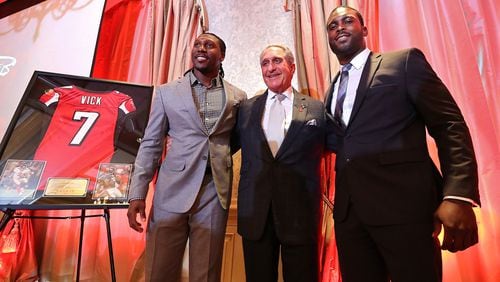The Falcons reaped great value from the 27th pick of the 2005 draft. They banked 11 seasons, six of which yielded more than 1,000 receiving yards, four of which saw this receiver make the Pro Bowl. From Sharod Lamor White – ‘’my government name,” the man himself noted – the Falcons got their money’s worth.
From the No. 1 overall pick of the 2001 draft, they got an awful lot – a slew of thrilling Sundays; an always-packed Georgia Dome; two playoff victories, the first coming at Lambeau Field – but our lingering memory of Michael Dwayne Vick will be of promises broken. He excited us, yes. He tantalized us, yes. Ultimately he disappointed us.
White and Vick were allowed to retire as Falcons in a ceremony held at Arthur M. Blank’s palatial offices Monday. It was a moment both nice (in one case) and bittersweet (in the other). Roddy White, as the argot has it, left it all on the field. Michael Vick left much undone.
In his introductory remarks, Blank recalled a conversation he had with the Hall of Fame quarterback Steve Young, who deemed Vick “more talented at that position than anyone who ever played the position.” That’s a tag No. 7 will wear into retirement – most talented quarterback ever – but that’s not the same as being the best quarterback ever.
Not long ago, Vick said he “revolutionized the game,” which sounded portentous but isn’t true. Randall Cunningham, Steve McNair and Young were earlier dual threats. It’s a fact that nobody ever ran as fast and threw as hard as Vick. It’s also a fact that he – even with his 1,000-yard rushing season, even with four Pro Bowl nods – never maxed out his massive gifts. The one time he appeared the closest to so doing, he wound up in jail.
Apologies for bringing up dogfighting yet again, but can we tell the tale of Michael Vick without mentioning where it went wrong? Blank acknowledged it Monday, speaking of “second and third chances” and saying: “Like everyone living on this Earth, he made a mistake … But we speak of redemption and moving on, and none (exemplify that) more than Michael Vick. He has become a living example of how to make a better choice.”
Vick himself recalled his months in Leavenworth “when times were darkest.” Three days after his release, he recalled Blank arriving in Virginia bearing food from Stoney River Steakhouse and Grill. “Looking to the future,” was how Blank characterized that greet-and-grub visit. (Travel tip: Food keeps better when you have a private jet.)
If there was an odd note to Monday’s ceremony, it was that a name seldom uttered in Falcons circles – Petrino – was broached by both honorees. White’s first two season here had been indifferent. Nobody had labeled him a Round 1 bust just yet, but the clock was ticking. Bobby Petrino, the team’s head coach for 13 games in the overheated autumn of 2007, told White that he was going to be his No. 1 receiver. White caught 83 passes for 1,202 yards that season, numbers made more impressive when we note his quarterbacks were the retreads Joey Harrington and Byron Leftwich.
Petrino left Louisville to coach Vick. When he was the Jaguars’ offensive coordinator and Vick had just left Virginia Tech as the No. 1 of No. 1s, he’d sit with defensive coordinator Dom Capers on the team plane and talk about what a coach might do with a quarterback like that. Believing Vick had been poorly suited to Greg Knapp’s West Coast offense, they hired Petrino. After an offseason workout in the Flowery Branch fieldhouse, the man who never gushed about anything told an associate, “We’re going to average 30 points a game.”
For all the what-ifs in Atlanta sports history, the greatest is this: What if Petrino had actually worked with Vick? (Day 1 of Petrino’s only training camp dawned without Vick, who was in a Virginia courtroom, and saw a plane circle the field bearing the banner: “New team nickname: Dogkillers.”) It would take the wayfarer many more stops, but we saw last fall what that coach could do with that kind of quarterback. Lamar Jackson has a Heisman to show for it.
By the time a real offensive coach got to work with Vick, he was coming off two missed seasons due to incarceration and was on the high side of 30. Philadelphia’s Andy Reid helped turn Vick, for whom accuracy was always an issue, into a passer capable of completing 60 percent of his passes and got him back to the Pro Bowl, but a series of injuries forced the Eagles to look elsewhere. By the time he was 33, the most talented man ever to play the position had been rendered a backup.
Todd McClure, Vick’s center for those giddy years here, invoked the names of Michael Jackson (the singer, not the Georgetown guard), Michael Jordan and Michael Phelps in the attempt to put the Falcons’ famous Michael in perspective. “He was the King of Atlanta,” McClure said. “He changed the culture. He changed the way we viewed this team.”
Credit the man known as Mud Duck for telling an absolute truth. No professional athlete – not Aaron, not Chipper, not Dominique, not Glavine/Maddux/Smoltz – had ever meant as much to this city as Vick. Said White: “He was like a god. Even when he’d go out, he couldn’t go out. So he’d stay home.”
It’s noteworthy than Vick and White, barely 16 months apart in age, spent just two seasons together. Of White’s 63 touchdown receptions, only three resulted from Vick throws. White credits Vick — the only Falcons employee who used his given name — for telling him, “Sharod, you’re going to be a star.” But seeing the two posing for pictures Monday only brought home another might-have-been.
What if both had reached their peak under Petrino? What if White had become the big-time receiver Vick never had? (Apologies to Brian Finneran, who introduced White by saying, “He played football the right way.”) What if the 2007 Falcons had averaged those 30 points — only the 16-0 Patriots managed as much that year — and made the playoffs? Would Petrino have thought twice about Arkansas? (Being Petrino, probably.) Would we have stopped discussing Vick in terms of potential and possibilities, marveling instead at what he’d become?
We’ll never know. He’ll never know. He could have been great. He wasn’t quite.
About the Author







